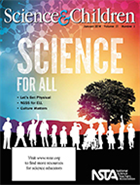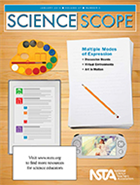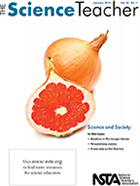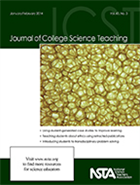NSTA's K-College Science Education Journals: January 2014 Issues Online
By Lauren Jonas, NSTA Assistant Executive Director
Posted on 2014-01-09
Communicating science—NSTA’s journals are all about it this month—helping children be captivated by the wonders of science, empowering them to share, and making science relevant to students as they grow into responsible citizens. The links below will take you to science education resources written by educators, for educators. NSTA’s January 2014 journals are live online (with select articles being free for all, and full content being free to all NSTA members). Browse these issues for classroom-tested ideas, activities you can use tomorrow, and commentary from experts in the field. And if you feel inspired, please keep the communication flowing in both directions—we’d love your comments on what you liked, didn’t like, and especially on what works in your classroom!
 Science and Children
Science and Children
All students must be provided with equitable opportunities to be captivated by the wonders of science. This month’s issue is filled with resources for making science in your classroom engaging, inclusive, and accessible to all.
Featured articles (please note, only those marked “free” are available to nonmembers with out a fee):
- Culture Matters in Science Education
- Free – Editor’s Note: Science for All
- Free – Let’s Get Physical
- NGSS for English Language Learners
- The Power of Multimodal Representations
- What’s the Weather Like Today?
- Full Table of Contents
 Science Scope
Science Scope
Providing students with a variety of ways to communicate their ideas and share their knowledge helps build their confidence and keeps them engaged. Check out the activities in this issue for creative ways for students to express themselves in the science classroom.
Featured articles (please note, only those marked “free” are available to nonmembers without a fee):
- Free – Editor’s Roundtable: Meet Me in the Middle in Boston
- Engage. Elaborate. Evaluate! Virtual Environment-Based Assessments of Science Content and Practices
- Every Assessment Tells a Story
- Science + Art = Enhanced Learning Experiences for Students
- Standardized Test Questions: A Tool for Developing Students’ Proficiency With the Framework’s Science Practices
- Stomp Rockets: A High-Impact Exploration of Science Concepts
- Supporting Linguistically Diverse Students in an Era of Science Education Reform
- Free – The Leonardo Strategy: Scientific Discourse and Argumentation in an Online Environment
- Using Place-Based Inquiry to Inspire and Motivate Future Scientists
- Full Table of Contents
 The Science Teacher
The Science Teacher
Teaching science has important implications for human society and the future of our planet. All students will need to make ethical decisions about complex socio-scientific issues that arise as a consequence of new science and technology. This issue of The Science Teacher focuses on bioethical issues such as genetic engineering, access to health care, and personal medical decisions. Students will also need to be able to think critically about energy allocation, individual resource consumption, climate change, access to food, and distribution of scarce resources. By emphasizing these socio-scientific connections, we help students learn important content while developing their ability to make informed decisions about critical issues. This edition of the journal will help you bring the necessary emphasis to your own classroom.
Featured articles (please note, only those marked “free” are available to nonmembers without a fee):
- Free – Career of the Month: An Interview With Ecosystem Scientist Stan Wullschleger
- Classification
- Free – Editor’s Corner: Crosscutting Patterns
- Science Challenge Day
- Science Immersion
- What Makes Us Tick…Tock?
- Free – Where’s That Dolphin?
- Full Table of Contents
 Journal of College Science Teaching
Journal of College Science Teaching
Given the financial pressures faced by many colleges and universities, the hiring of temporary faculty has become more common; read about the challenges and benefits of being an adjunct professor in Ann Cutler’s Editorial and in Robert Liftig’s Point of View. Don’t miss the article on an outdoor environmental project designed to connect with students’ real-world experiences in the Two-Year Community column. And don’t forget to read the Research and Teaching article on a new instructional model that focuses on teaching students to use foundational principles rather than rely on a multitude of facts to improve their understanding of core scientific concepts.
Featured articles (please note, only those marked “free” are available to nonmembers without a fee):
- A Multidisciplinary Laboratory Course in Color Science
- Free – Editorial: Good Help Is NOT Hard to Find
- Introducing Transdisciplinary Problem Solving to Environmental Management Systems and Geology Students Through a Case Study of Disturbed Coastal Systems
- Remeasuring Postsecondary Teaching: How Singular Categories of Instruction Obscure the Multiple Dimensions of Classroom Practice
- Research and Teaching: Collaborative Testing: Evidence of Learning in a Controlled In-Class Study of Undergraduate Students
- Research and Teaching: Principles, First and Foremost: A Tool for Understanding Biological Processes
- Student-Generated Cases: Giving Students More Ownership in the Learning Process
- Free – Teaching About Ethics and the Process of Science Using Retracted Publications
- Teaching Science and Mathematics: Preservice Teachers’ Perceptions of Knowledge Needs
- Full Table of Contents
Disclaimer: The views expressed in this blog post are those of the author(s) and do not necessarily reflect the official position of the National Science Teaching Association (NSTA).


